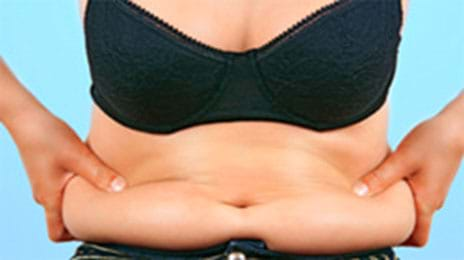Reviewed by Dr. Mary James, ND
As many women enter perimenopause (approach menopause), they often find themselves experiencing unexplained weight gain and/or changes in fat distribution — especially around the waist. Methods of weight management that worked for them for years may now be oddly ineffective.

In fact, weight gain in the abdomen is one of the most common complaints of perimenopausal women. Yet most women have been told that an extra 10–20 pounds is simply a ‘rite of passage’ at this time of life and they should just accept their “middle-age spread” as part of the natural aging process.
But you don’t have to. There is no reason why you should settle for anything at this stage of your life, let alone weight gain. Sure, things may get a little more complicated during perimenopause and menopause. Hormonal fluctuations, changes in thyroid function and even long-term toxin exposure can result in some extra weight and a spreading waistline. But it doesn’t mean that you’re stuck with it. Weight gain in menopause can challenge our self-esteem and sense of well-being, and abdominal fat actually carries with it some significant health risks. The sooner you can get on top of these tendencies, the easier it will be for you over the next several years.
Menopause weight gain
The same metabolic set point holds true for your post-menopausal body as it did before “the change.” Menopause weight gain is just another symptom resulting from your system being out of balance. To restore balance, you need to figure out what is going on at the core of your physiology and emotions.
One of the blessings of menopause is that it strips away the masking effects of estrogen. While this process may produce symptoms, it makes it easier to get a handle on underlying individual susceptibilities and what’s not functioning well for you. Many women have conditions such as insulin resistance or adrenal fatigue that have been developing for a long time, but it’s only after their estrogen levels dip that the symptoms become noticeable. Once apparent, it becomes easier to know what to do about it.

Why does weight gain occur so easily for women as they age and become one of the top menopause symptoms for so many of us? It depends on the individual, but there are a few causes that are very common. Worldwide, the prevalence of obesity has doubled since 1980. Because this is most notable in developed countries, much of this trend can be traced to a sedentary lifestyle and consumption of highly processed foods. Also, your fat cells and your hormones are part of a system-wide biofeedback network that orchestrates your appetite, metabolism, heat regulation, digestion and detoxification. Any chronic disturbance in the crosstalk among systems has the potential to produce weight gain (and a host of other menopausal symptoms, like hot flashes, food cravings and menopause belly).
The causes of unexplained weight gain in menopause
Abdominal fat accumulation: One of estrogen’s actions in women is to deposit fat around the hips, rather than the waist. When your ovaries stop producing estrogen in menopause, this effect stops as well. The result is a redistribution of fat from the hips to the belly. Once ‘pear-shaped,’ we may now find ourselves becoming more ‘apple-shaped,’ even if we haven’t necessarily gained extra pounds. The prevalence of abdominal obesity increases dramatically during the menopausal years, but it’s not inevitable.
Insulin resistance: This increase in belly fat raises our ‘metabolic risk.’ This means that insulin resistance can form, blood glucose and insulin levels can increase, metabolic syndrome may develop, and our risk of type 2 diabetes can skyrocket. With these changes come cardiovascular risks. While metabolic imbalances are more common in menopause, only the women with expanding waist lines are at significant risk. Genetic predisposition can also tip the scales, as can diet. For years, many women followed the conventional low-fat, high-carbohydrate diet, with lots of refined carbs and sweets. Over time, this kind of diet alone can reduce insulin sensitivity. But when you’re insulin-resistant, your body converts calories into fat more easily — even if you’re dieting. The result is that while you are gaining weight, your cells are actually starving!
Low thyroid function: The incidence of hypothyroidism increases as women enter menopause. Why would this be? One reason is that autoimmunity increases with aging, including autoimmune thyroid disease (also called Hashimoto’s). One of estrogen’s actions is to help your immune system tolerate your body’s own cells, including the thyroid. As estrogen plummets, thyroid autoimmunity can develop in genetically susceptible women, causing thyroid function to become imbalanced. Low thyroid activity results in a lower metabolism and easier weight gain (along with a host of other symptoms).
Loss of lean body mass: As women enter menopause, they commonly lose some of their lean (muscular) tissue. The good news is that this results primarily from exercising less as we age (an easy fix!). Regular exercise and maintenance of muscle mass supports insulin sensitivity, boosts your metabolism and stimulates your body’s natural appetite-control signals. The net result of all of these actions is easier weight management. Aerobic exercise preferentially targets abdominal fat and resistance exercise helps preserve that lean muscle tissue, especially during weight loss diets.
Chronic stress: Stress can be emotional or physical (e.g., inflammatory disorders, infection or allergies). Any of these makes our adrenals pump out extra cortisol to help us handle the stress. This is a normal response, but it’s designed to be short-term. Most of us are under a tremendous amount of stress — sometimes more than we realize. Unrelenting stress can result in persistently high cortisol levels. Besides having adverse effects on several aspects of our health, high cortisol from chronic stress makes us crave junk food — the very type that piles on extra fat. It also contributes to that expanding waistline. Why? Because extra cortisol receptors in deep abdominal tissue cause our bellies to form more fat in response to stress.
Inadequate sleep: Getting quality sleep can become a challenge in perimenopause if you’re one of the many women out there who experience hot flashes and night sweats during this transition. Chronic stress can also cause us to go to bed at night with a noisy head that interferes with quality slumber. Sleep is important for weight regulation because of its effects on leptin and ghrelin — two appetite-regulating hormones. Release of leptin, which tells your brain that you’ve eaten enough, depends on getting enough sleep. Meanwhile, good sleep suppresses the release of ghrelin, a hormone that makes us crave sweet and high-fat foods. When both of these hormones are imbalanced, we can find it difficult to stop eating, especially the foods that are so bad for us.
Chemicals and toxins add to the problem
When it comes to weight control, artificial sweeteners are not a solution, but rather part of the problem. Although they boast zero-caloric content, they fail to stimulate appetite-control peptides that are normally stimulated by natural sweeteners. They also encourage the development of insulin resistance. One large study found that drinking more than 21 artificially sweetened beverages per week doubled the risk of being overweight or obese. High-fructose corn syrup (added to soft drinks and other foods) is even more dangerous, exacerbating insulin resistance and cardiovascular risk that are already challenges in menopause.
Adding more artificial chemicals to your body at this time can exacerbate the “toxic load” you are carrying. By midlife, most women have had years of cumulative exposure to allergens, pesticides, plastics, chemicals, heavy metals, bacteria, and other poisons and irritants. Artificial and biological debris that can’t be eliminated gets stored in our fat cells.
Over time, a woman’s system can get so gummed up by toxins that it just can’t function well — and it is often the case that the more fat cells she has, the more toxins she has stored. When a woman begins to lose weight dramatically, as on a crash diet, these toxins get released into the body in a flood and can cause miserable symptoms as the body attempts to expel them. The body at this point just wants to get back to homeostasis (even if what it interprets as normal isn’t healthy), and will sabotage even the best intentions to lose weight.
The toxic load may be just one part of a broader pattern of inflammation — which often shows up during menopause. Dysbiosis, yeast and food sensitivities, and an immune system imbalance can short-circuit weight loss. Toxicity triggers the immune system to be on full alert, as do any unaddressed food allergies. Many women have been sensitive to certain foods for decades but only realize it after they lose estrogen’s soothing effect on the digestive tract.
The truth about weight loss during menopause
So the truth is, weight loss is not just about willpower or ‘calories in/calories out.’ Both are myths given to us by the diet industry that doom us to failure. Fad diets simply don’t work — over 95% of dieters gain back the weight they lose and more — because they oversimplify a very complex process.
The links between hormonal balance, insulin resistance, inflammation, toxicity and body fat aren’t the only factors that cause both menopause and perimenopause weight gain. Unresolved emotional issues are often at the root cause of unhealthy eating habits — they might be considered their own kind of toxin! Finding all the support you need to address ‘emotional eating’ will make weight management in menopause a much easier process for you.
We have learned that you have to get healthy before you can lose weight and keep it off. Once you establish baseline health, your body will naturally seek and maintain its ideal weight. The first step is to follow the approach we suggest in our nutritional and lifestyle guidelines — our more detailed guidelines are in the eGuides of our Hormonal Health Programs, along with steps to relieve all your menopause symptoms naturally.
Shifting into menopause is no reason to accept someone else’s idea of what your limitations are — in fact, the opposite is true! There is no better time than now to begin building a stronger health foundation. This is the time in your life to discover the best in yourself, including your power to finally deal with the core issues that may have hindered earlier weight loss efforts.
Davis SR, Castelo-Branco C, Chedraui P, et al. Understanding weight gain at menopause. Climacteric. 2012 Oct;15(5):419-429.
Carr MC. The emergence of the metabolic syndrome with menopause. J Clin Endocrinol Metab. 2003 Jun;88(6):2404-2411.
Davis SR, Castelo-Branco C, Chedraui P, et al. Understanding weight gain at menopause. Climacteric. 2012 Oct;15(5):419-429.
Badawy A, State O, Sherief S. Can thyroid dysfunction explicate severe menopausal symptoms? J Obstet Gynaecol. 2007 Jul;27(5):503-505.
Gameiro CM, Romão F, Castelo-Branco C. Menopause and aging: changes in the immune system–a review. Maturitas. 2010 Dec;67(4):316-320.
Wang Z, Ying Z, Bosy-Westphal A, et al. Evaluation of specific metabolic rates of major organs and tissues: comparison between men and women. Am J Hum Biol. 2011 May-Jun;23(3):333-338.
Carr MC. The emergence of the metabolic syndrome with menopause. J Clin Endocrinol Metab. 2003 Jun;88(6):2404-2411.
Davis SR, Castelo-Branco C, Chedraui P, et al. Understanding weight gain at menopause. Climacteric. 2012 Oct;15(5):419-429.
Dallman MF. Stress-induced obesity and the emotional nervous system. Trends Endocrinol Metab. 2010 Mar;21(3):159-165.
Pedersen SB, Jønler M, Richelsen B. Characterization of regional and gender differences in glucocorticoid receptors and lipoprotein lipase activity in human adipose tissue. J Clin Endocrinol Metab. 1994 Jun;78(6):1354-1359.
Meier U, Gressner AM. Endocrine regulation of energy metabolism: review of pathobiochemical and clinical chemical aspects of leptin, ghrelin, adiponectin, and resistin. Clin Chem. 2004 Sep;50(9):1511-1525.
Smeets PA, de Graaf C, Stafleu A, et al. Functional magnetic resonance imaging of human hypothalamic responses to sweet taste and calories. Am J Clin Nutr. 2005 Nov;82(5):1011-1016.
Fowler SP, Williams K, Resendez RG, et al. Fueling the obesity epidemic? Artificially sweetened beverage use and long-term weight gain. Obesity (Silver Spring). 2008 Aug;16(8):1894-1900.
Fowler SP, Williams K, Resendez RG, et al. Fueling the obesity epidemic? Artificially sweetened beverage use and long-term weight gain. Obesity (Silver Spring). 2008 Aug;16(8):1894-1900.
Bray GA. Soft drink consumption and obesity: it is all about fructose. Curr Opin Lipidol. 2010 Feb;21(1):51-57.










